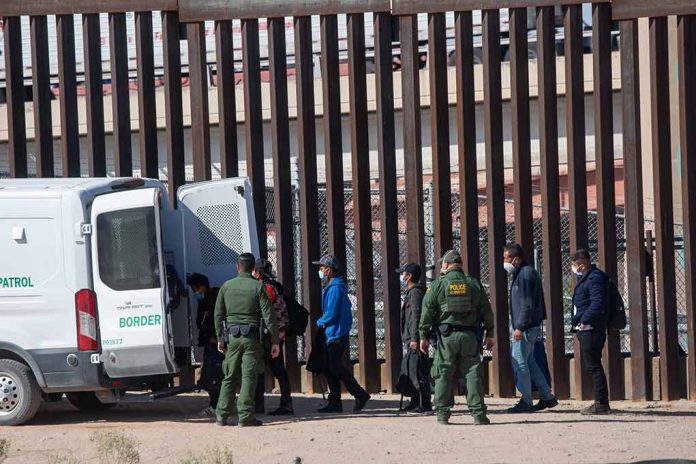
President Trump unveils a bold new border control strategy offering financial incentives for undocumented immigrants to self-deport, while promising legal pathways to return for those who qualify.
Key Takeaways
- Trump proposes paying undocumented immigrants a stipend and airfare to voluntarily leave the United States.
- The plan prioritizes deporting criminals while creating legal pathways for “good” migrants to return.
- Self-deportees using the CBP One app would receive priority consideration for legal reentry.
- The Department of Homeland Security has updated the CBP One app to facilitate self-deportation registrations.
- Nearly one million migrants have received formal termination notices with warnings to depart immediately.
Financial Incentives for Voluntary Departure
President Donald Trump has introduced a novel approach to address the ongoing border crisis by offering financial incentives to undocumented immigrants who voluntarily leave the United States. In a recent interview, Trump outlined his plan to provide monetary assistance and plane tickets to those willing to self-deport. The program aims to create a more structured process for managing immigration while prioritizing national security concerns. Although specific details about implementation timing and exact payment amounts remain unclear, the initiative represents a significant shift in immigration enforcement strategy.
The self-deportation program is designed to be “comfortable” for participants according to Trump, distinguishing it from traditional deportation operations. Trump’s administration has updated the Customs and Border Protection (CBP) One app to allow migrants to register for self-deportation, creating a technological framework to support the process. Those who utilize this system would potentially receive preferential treatment when applying to return through legal channels, offering an incentive beyond the immediate financial benefits of the stipend and transportation assistance.
U.S. President Donald Trump said in an interview aired on Tuesday that he planned to roll out a new program offering money for immigrants in the country illegally to leave voluntarily. https://t.co/6C50LBCSLi pic.twitter.com/WpWviPT5pb
— Reuters (@Reuters) April 16, 2025
Selective Enforcement and Legal Reentry Pathways
A key component of Trump’s strategy involves focusing deportation efforts on individuals with criminal records while creating pathways for others to potentially return legally. This selective approach aims to balance border security concerns with economic considerations, particularly regarding industries dependent on immigrant labor. The administration has explicitly stated its intention to facilitate legal reentry for those migrants deemed beneficial to the American economy, particularly in sectors like agriculture and hospitality that traditionally rely on immigrant workers. “We’re going to give them a stipend. We’re going to give them some money and a plane ticket, and then we’re going to work with them – if they’re good – if we want them back in, we’re going to work with them to get them back in as quickly as we can,” explained Trump.
The administration has indicated that nearly one million migrants have already received formal termination notices with instructions to self-deport immediately. Those who fail to comply with these notices could face permanent bans from reentering the United States, creating significant consequences for non-compliance. This carrot-and-stick approach aims to encourage voluntary participation while maintaining enforcement mechanisms for those who refuse to cooperate with the program.
Economic Considerations and Industry Impact
Trump has emphasized the importance of maintaining access to immigrant labor for key American industries, particularly agriculture and hospitality services. The proposal includes provisions for recommending workers to these sectors, suggesting a potential system that would match returning legal immigrants with employers in need of labor. This acknowledgment of economic realities reflects the complex balance the administration is attempting to strike between immigration enforcement and maintaining workforce availability for critical economic sectors.
The program comes amid ongoing criticism regarding recent deportations to El Salvador and other countries, raising questions about the conditions deportees may face upon return. The administration has defended these actions through Press Secretary Karoline Leavitt, who maintains that the policy prioritizes American citizen safety above all other considerations. For immigrant families currently in the United States without documentation, the announcement creates uncertainty about whether participation in self-deportation would ultimately lead to successful legal reentry or result in prolonged separation.
Sources:
Trump offers illegal migrants money and airplane ticket to self-deport to fix border crisis







